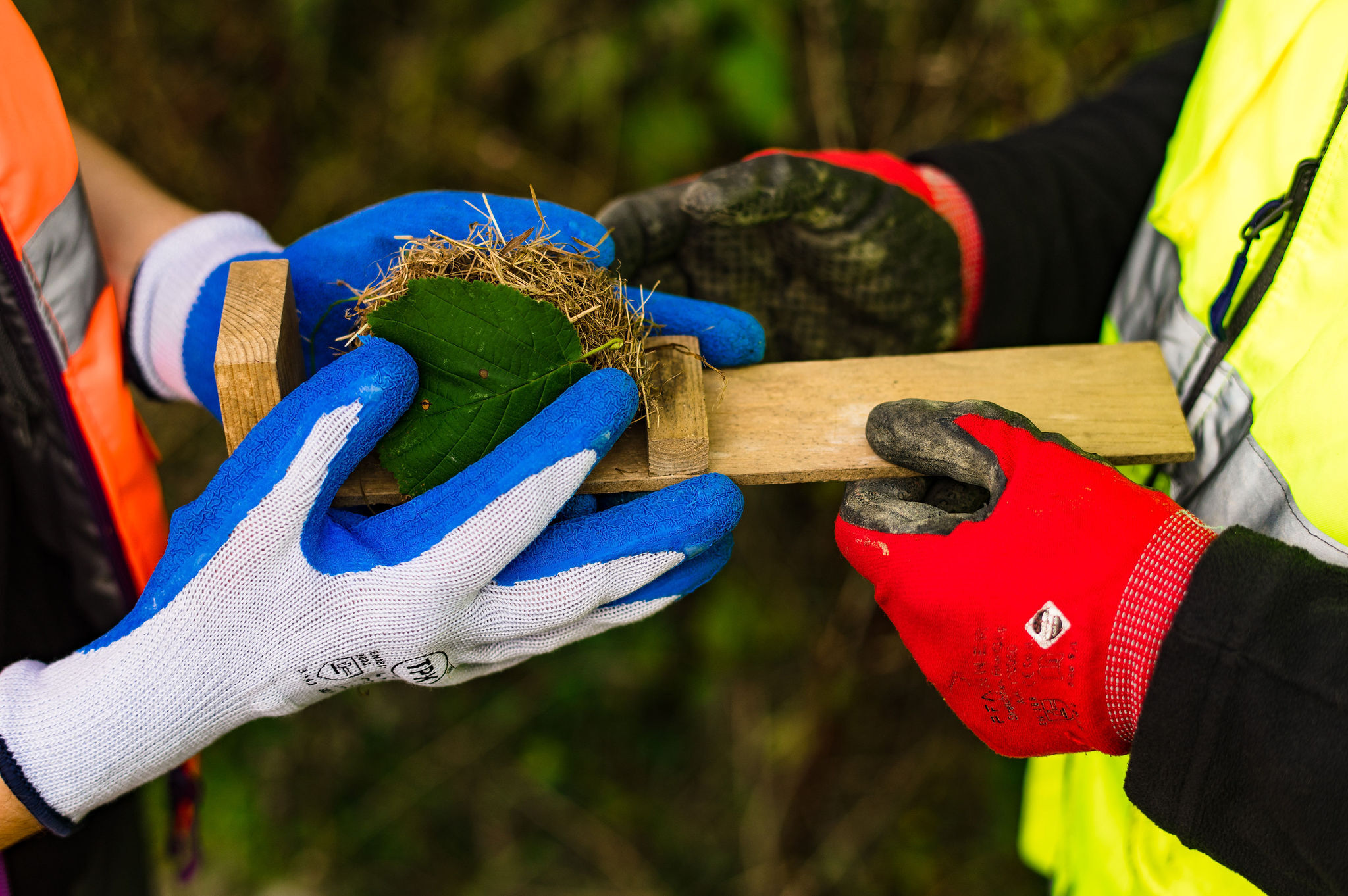
23.7K
Downloads
53
Episodes
A monthly show where we get to talk and learn about all things ecological, including interviews with top ecologists (both employers and employees), those working with ecologists, and also aspiring and inspiring career-seeking individuals setting out to make a difference. New episodes released first Monday of the month.
Episodes
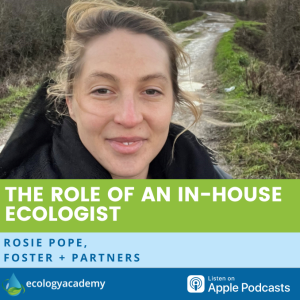
Monday Jul 03, 2023
Monday Jul 03, 2023
The Role of an In-house Ecologist
In this interview Richard talks with Rosie about her role as an in-house ecologist. Together they discuss the differences between the role of working as a 'clean' consultant ecologist and those of the in-house 'expert' within a company or organisation. The challenges of working in a creative and visual way, as opposed to the more text-based reporting.
Rosie Pope
Rosie Pope is the first in-house Ecologist at Foster + Partners. Having worked in consultancy previously, Rosie speaks about the challenges involved in carving out this new role. She discusses the way she works with the Architects and other specialists to try and achieve positive outcomes for biodiversity. Rosie is currently on Maternity Leave with her baby daughter.
Our courses
Coaching
Coaching is a powerful, transformative relationship designed to empower you to realize your personal and professional potential. As a business and life coach, we work with you to explore your goals, challenges, and fears, guiding you to uncover roadblocks and empowering you to create solutions from within.
Whether it's navigating career changes, improving relationships, or building confidence, coaching provides you with sustainable tools, insights, and strategies to self-improve, adapt, and thrive in any circumstance. It's an investment in your future, acting as a catalyst for you to stride forward with confidence and clarity, and transform your dreams into reality.
Register your interest here: https://training.ecologyacademy.co.uk/courses/career-coaching
Employee courses
Are you an employer or looking for a career as an ecologist?
We run our popular 'Career Ecologist' Course. A course that is tailored to the needs of your employees and the individual. No two courses are exactly the same!
The course can cover technical skills, such as 'preliminary roost assessment' or 'preliminary ecological appraisal' fundamental training. We also cover the equally important transferable skills such as 'people management' and 'information management'.
To find out more either click on the course link (https://training.ecologyacademy.co.uk/courses/early-career-ecologists) or email hello@ecologyacademy.co.uk
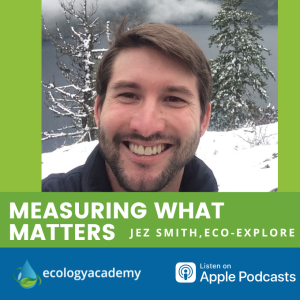
Monday Jun 05, 2023
Monday Jun 05, 2023
Richard talks on today's show with Jeremy Smith on why we should take data seriously. On the show Jez tells us why we need to think and ask more questions to help solve real life problems such as biodiversity loss.
Jez Smith
Jez is a research ecologist for the British Trust for Ornithology using data analysis to help understand the trends in bird demography.
He is also one of the directors at Eco-Explore a company founded by ecologists who provide training in Data Analysis to consultant ecologists, NGO’s, PhD students, conservation scientists and government departments.
His background has often involved data analysis in one way or another and also ecology and Jez has a passion for teaching and helping people identify where understanding data better can help them.
About Eco-Explore
Eco-explore Community Interest Company is a scientific research and communication enterprise, established in 2010.
A start-up grant from Caerphilly Borough Council, and close links with Cardiff University and the Wildlife Trusts of South and West Wales, have enabled us to diversify into a variety of roles:
- Guided walks and Wildlife Events; citizen-science, collecting biodiversity data and experiencing Wales’ wonderful wildlife
- Overseas expeditions; making discoveries and aiding conservation
- Environmental consultancy; providing data and advice on a range of conservation issues
- Data analysis; teaching statistics, data analysis consultancy and publishing our own data analysis guidebook
- School, Undergraduate and graduate training; with Cardiff University – hosting school work experience placements, university Professional Training Year placements, and co-supervision of PhD projects
- Promoting local conservation; practical conservation, grant funding and campaigning
- Supporting conservation NGOs; Eco-explore is a not-for profit organization – revenue is used to support joint projects in collaboration with conservation NGOs, primarily with the Wildlife Trusts Wales and through the Welsh Wildlife Partnership scheme, helping to conserve Wales’ wildlife for future generations.
Connect via:
Twitter: @Ecoexplore
Facebook: Eco-Explore Community Interest Company
LinkedIn: https://www.linkedin.com/company/eco-explore-community-interest-company/
New courses in 2023: http://www.eco-explore.co.uk/statistics-training/
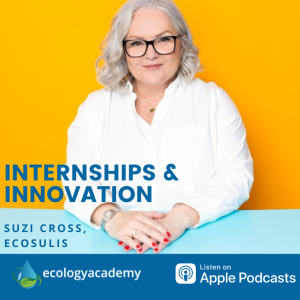
Monday May 01, 2023
Monday May 01, 2023
In this episode Richard interviews the highly engaging and enigmatic Suzi Cross, Managing Director for Ecosulis.
About Suzi
Suzi Cross has been Managing Director of Ecosulis Ltd for the last few years, having first joined the company in 2004 as a Senior Administrator. She specialises in Quality, Health and Safety, Employee Engagement and Wellbeing and has a passion for the outdoors. Running a values-lead organisation is something she considers a dream job because the people she brings on board share those values and the company’s vision to rewild half the planet by 2050.
About Ecosulis
Ecosulis are dedicated to recovering nature, by designing and delivering efficient and scalable nature-based solutions for people and planet. They work with clients to identify nature-based solutions that deliver high biodiversity gains on sites across the UK and beyond, with minimal interventions. By crafting these solutions to fit the site, they cost-effectively deliver high quality results that stand the test of time.
Ecosulis are always on the lookout for new partnerships, collaborators and people who want to get involved with an innovative organisation that not only dreams big but delivers on it’s dreams. If you’d like to get in touch with Suzi, either drop her an email (suzi.cross@ecosulis.co.uk) or a message on LinkedIn www.linkedin.com/in/suzijcross
Internships
Ecosulis offer a number of internships to support the growth of our future experts, and the rewilding sector itself.
We want to share rewilding principles and values for the benefit of future generations, to help the continued recovery of nature at a massive scale.
Alongside our wider educational and academy initiatives sits our paid internship programme, which is now entering its third year. The roles last 12 months, and offers a structured scheme for knowledge development and experience building in both rewilding and nature recovery. During this time, you’ll be working side by side with our experts and industry leaders, getting practical insight into real-world projects.
Our hope is that we can offer you a position with Ecosulis beyond the first year; otherwise, we aim to continue to support you after you leave us, and help you find a job that’s right for you. With connections to leading rewilding organisations and practitioners across the globe, we can offer the stepping stone you need to start your career.
Find out more and what they have to offer here: https://ecosulis.co.uk/careers/internships/

Monday Apr 03, 2023
#30 - A Chat with ChatGPT - is AI going to replace us as ecologists?
Monday Apr 03, 2023
Monday Apr 03, 2023
In this episode, Richard 'talks' to ChatGPT. He talks about what he's been using ChatGPT for and what it could be used for.
What is ChatGPT
ChatGPT is an artificial intelligence language model developed by OpenAI. It is designed to process natural language input and generate responses in natural language. It has been trained on a vast corpus of text data, which allows it to understand a wide range of topics and converse with users on a variety of subjects. ChatGPT can be used for a variety of applications, including chatbots, language translation, text summarization, and more.
Pros and Cons for using ChatGPT for ecologists
Pros:
- Time-saving: Ecologists can use ChatGPT to quickly generate written reports, research papers, and other written materials, which could save a significant amount of time and allow them to focus on other tasks.
- Efficient data analysis: ChatGPT can process large amounts of ecological data and generate insights and patterns that ecologists can use to better understand the environment.
- Increased accessibility: ChatGPT can assist ecologists in communicating complex scientific concepts to non-expert audiences, potentially improving public engagement and understanding of ecological issues.
- Personalized recommendations: ChatGPT can use data to provide personalized recommendations and insights to ecologists, such as suggesting new research areas to explore or identifying areas that require more attention.
Cons:
- Limited accuracy: ChatGPT, like any AI system, can sometimes make errors or generate inaccurate information, especially if it has been trained on biased data or if it is working outside its scope.
- Limited creativity: ChatGPT may not be able to generate truly innovative ideas or research directions, which could limit the potential of ecologists to explore new areas of ecological research.
- Limited engagement: Some ecologists may prefer face-to-face or direct interactions with their peers and colleagues, rather than communicating through an AI-powered system.
- Ethical considerations: Ecologists may need to consider ethical issues related to the use of AI in their work, such as data privacy and security concerns, and ensuring that ChatGPT is not used to replace human workers or undermine scientific rigor.
Example of a bad prompt to use for ChatGPT
How do I get a job as a consultant ecologist?
Example of a better prompt to use for ChatGPT
Write a plan of action of what qualifications and skills I would need to gain employment, after graduating from university, as an ecological consultant working within the UK.
Example of a really great prompt to use for ChatGPT
Please ignore all previous instructions. You are a biological sciences graduate from a UK university and seeking to gain employment as a consultant ecologist within the UK. Although you have not had any formal training as a consultant ecologist you are passionate about the natural environment and want to make a difference and help restore biodiversity loss. I want you to write out a detailed plan, including an estimated timeline, of how this recent graduate would gain employment, including what skills, knowledge and behaviours they would need to gain employment, how they should undertake effective research in to gaining employment that aligns with their own values. Assume that they need to do this within 12-18 months and have some but limited monetary funds. Do not self-reference. Do not explain what you are doing.

Friday Mar 10, 2023
Friday Mar 10, 2023
On today's podcast Richard discusses the opportunities and challenges of a dual-discipline career with his colleague, Misho Baxendale.
Misho is a dual-qualified environmental consultant, working across both ecology and arboricultural disciplines working at Wildwood Ecology, based in Stroud. Misho openly discusses the skills needed in both disciplines including complimentary and crossover skills (e.g. field surveys, data capture and analysis), and specialist skills (e.g. AutoCAD, tree climbing and tree surveys for planning and development).
The conversation also includes why Misho works with Wildwood Ecology in developing arboricultural services and the opportunities and challenges faced at the individual and company level.
Looking for a career with trees? Find out more by visiting the Arboricultural Association website: https://www.trees.org.uk/
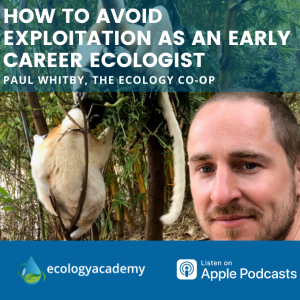
Wednesday Feb 15, 2023
#28 - Exploitation of early career ecologists: Interview with Paul Whitby, Ecology Co-op
Wednesday Feb 15, 2023
Wednesday Feb 15, 2023
Career exploitation refers to situations in which an employer or work environment takes advantage of an employee for their own benefit, often at the expense of the employee's well-being and long-term career prospects. This can take many forms, such as paying employees less than they deserve, not providing adequate opportunities for growth and development, or assigning them work that is outside of their job description or skill set.
Furthermore, career exploitation can lead to feelings of burnout, job dissatisfaction, and a lack of motivation to continue working in a particular field. It can also limit an employee's future career opportunities by not providing the necessary skills and experience to advance to higher-level positions.
So how can early career ecologists, with maybe only a limited knowledge of the work of an ecological or environmental company identify the signs of exploitation, and if found what can they do about it?
Well, helping us to understand this topic is our guest today, Paul Whitby, Managing Director and Principal Ecologist at The Ecology Co-op.
How to avoid exploitation in ecological consultancy?
If you want to avoid exploitation in your career, and help create a better industry for other aspiring ecologists, here’s some suggestions for what you can do:
- Understand what you value from your career. Why are you doing it? Depending on your reasons, are there any trade-offs you would be willing to make and to what threshold?
- Do your research and due diligence. Do your online research, ask questions, or seek answers about the company or organisation you are looking to work for. Try talking to previous employees to make sure the role you’re considering will meet your expectations.
- Create your own career opportunities. Don’t limit yourself to what you see advertised. Identify your goals and companies / organisations or people that could be a match, and reach out to them.
- Report inaccurate advertising or mistreatment. If you’ve done your research and an experience doesn’t provide what was promised, this is exploitation. If a company, organisation, or individual is mistreating its employees, this is unacceptable and should be reported to the Chartered Institute of Ecology and Environmental Management (CIEEM).
Our Guest:
Paul is a Chartered Ecologist with fourteen years’ experience working as an ecologist and environmental consultant. His career began in Cheshire working on a number of large projects including gas pipelines, waste recovery centres, Liquid Natural Gas installations, and other commercial developments. After a short spell working back in his hometown of Petworth, Paul set up Azure Ecology in 2009, a small independent ecological consultancy working with a network of sub-contractors across south east England.
Paul founded The Ecology Co-operation in March 2014 to replace Azure Ecology and accommodate the expanding team of ecologists. Paul has working experience with a wide variety of British terrestrial wildlife and has managed projects of all sizes including writing Ecological Impact Assessments (EcIA), working as an expert witness at planning enquiries, and completing 23 Farm Environment Plans as part of Higher Level Stewardship applications across seven different counties. He has survey licenses for bats, dormice, and great crested newts and has held a number of European Protected Species licenses.
Aside from ecology, Paul’s interests include rugby, vegetable gardening, free diving, and pretending to be good at DIY.
Team Leadership Training for Ecologists:
Also, why not join us on 16 March at 11:00am for a FREE 45-minute Discovery Webinar to find out more about 'Team Leadership Training for Ecologists' from our course partners.
Register your interest here: https://training.ecologyacademy.co.uk/courses/discovery-webinar-team-leadership-training-for-ecologists
How to get in touch
You can follow us or get in touch via our socials or at hello@ecologyacademy.co.uk:
Website: https://training.ecologyacademy.co.uk/
LinkedIn: https://www.linkedin.com/company/ecology-academy/
Facebook: https://www.facebook.com/ecologyacademy
Instagram: @ecology_academy
Twitter: @ecology_academy
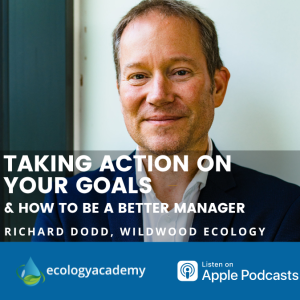
Monday Jan 09, 2023
#27 - Taking Action on Your Goals and How to be a Better Manager
Monday Jan 09, 2023
Monday Jan 09, 2023
We all need to make plans, but more importantly take action in implementing them!
This episode is not aimed to help you set goals, but instead it is focused on how to be a better manager. Whether you are a first line manager or a senior executive, we all need the tools to help us support ourselves and others.
If you're just starting out, you can download a copy of our Skills Wheel and Guidance Notes which will help you to make a start in recognising your areas of strength as well as those areas that could benefit from a little extra focus.
If you are new to 'managing' people then what support have you received to enable you to deliver the best results for your team, your company, and for you? Do you know what management style you need to use, when to use it, and why? Can you do so consistently? These are the questions that you need to ask yourself in how competent a manager you are and what action you may need to support you and others.
The Ecology Academy is developing a management training course for those new to, or soon to be, managing people. We recognise that management is not innate and needs to be developed over the entire duration of your time as an ecologist. This is not something you can learn after 1 day of training!
If you are interested in participating in our management training courses, then email us with an expression of interest to find out more at: hello@ecologyacademy.co.uk.
The podcast is available on all major streaming platforms, just search for 'Ecology Academy'.
If you have any recommendations for a future podcast topic, or would like to appear on the show, please do get in touch at hello@ecologyacademy.co.uk. We would love to hear from you!
How to get in touch
You can follow us or get in touch via our socials or at hello@ecologyacademy.co.uk
Website: https://training.ecologyacademy.co.uk/
LinkedIn: https://www.linkedin.com/company/ecology-academy/
Facebook: https://www.facebook.com/ecologyacademy
Instagram: @ecology_academy
Twitter: @ecology_academy
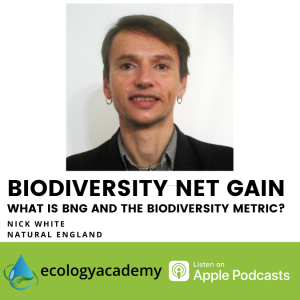
Monday Dec 05, 2022
Monday Dec 05, 2022
During this episode, host Richard Dodd interviews Dr Nicholas White, Principal Adviser on Net Gain for Natural England, and discusses what skills we need as ecologists to help deliver Biodiversity Net Gain (BNG). We get to hear Nick's insights into the Environment Act and the delivery of BNG, the newly updated biodiversity metric, standards, and guidance, as well as marine net gain!
Our Guest
Nick works across Government (at both a national and local level), and with developers, NGOs, and academia to advance policy, practice, and standards around net gain (including biodiversity, natural capital, and environmental net gain).
The current focus of Nick’s work is on biodiversity net gain legislation, the biodiversity metric, and biodiversity net gain standards and guidance, as well as working on the evolving approach to marine net gain.
As a non-ecologist, Nick is interested in how biodiversity and the natural environment can contribute towards wider social and economic benefits, and has a strong interest in green infrastructure, especially in relation to urban areas and its ability to enhance wider (grey) infrastructure resilience.
Nick enjoys engaging with different sectors and seeking opportunities to help secure the delivery of shared outcomes and has previously worked in the health, cultural, and charitable sectors.
This Episode
During the interview Richard and Nick discuss; how the biodiversity metric tool is not to be used as a decision-making tool, the need to bring ecologists on board at the earliest opportunity, the difference between a S106 Agreement and a Conservation Covenant, where to seek out training, and the advantages of on-site and off-site BNG delivery for developers.
We also talk about landowners offering land to help developers deliver BNG and the commercial incentives to doing so, the biodiversity off-set register, management plans, and monitoring.
This was a great discussion, and the Ecology Academy are very grateful to Nick for offering up his time to talk with us on the podcast.
The Ecology Academy will soon be launching our own Biodiversity Net Gain Fundamentals training course, so be sure to check that out if you would like to run through a case study on how to use the biodiversity metric.
The podcast is available on all major streaming platforms, just search for 'Ecology Academy'.
If you have any recommendations for a future podcast topic, or would like to appear on the show, please do get in touch at hello@ecologyacademy.co.uk. We would love to hear from you!
How to get in touch
You can follow us or get in touch via our socials or at hello@ecologyacademy.co.uk:
Website: https://training.ecologyacademy.co.uk/
LinkedIn: https://www.linkedin.com/company/ecology-academy/
Facebook: https://www.facebook.com/ecologyacademy
Instagram: @ecology_academy
Twitter: @ecology_academy
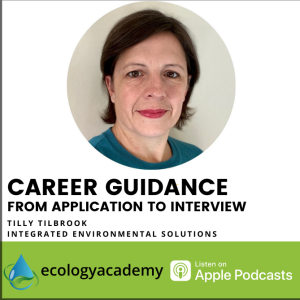
Monday Nov 07, 2022
Monday Nov 07, 2022
This month’s episode is from a discussion which was recorded as part of a live Q&A session for students at Nottingham Trent University during the delivery of our six-week Career Accelerator for Aspiring Ecological Consultants course for 2nd and final year students studying for a BSc in Wildlife Conservation.
Throughout the six weeks, students gained a thorough understanding of; the role of an ecological consultant and ecological consultancy, planning policy and legislation relevant to their work as an ecological consultant, considerations of what to put into a quote that would go to a client, preliminary roost assessment, preliminary ecological appraisal (both theoretical and practical application), protected species surveys and licensing, using QGIS to generate a habitat plan, report writing for ecological consultants, and finally, career guidance.
It was for this final career advice session that Tilly Tilbrook, Director at Integrated Environmental Solutions Ltd, kindly joined to share her expert insights on the recruitment process and what she looks for in candidates coming through as early career ecologists.
Our Guest
Tilly Tilbrook is a Chartered Ecologist who has worked in the industry since 2002. Her background includes working for local government, Natural England, and both small and large environmental consultancies. She founded Integrated Ecological Solutions Ltd in 2009, partly through a desire to work more ethically. Over the past thirteen years, she has employed many freelance and early career ecologists, and is part of the CIEEM working group looking at employment issues in the sector.
During this recording we discuss the job advert, job application cover letter, CV, interview process, and finally some extra thoughts on obtaining missing skills where time and/or money may be limited.
Resources
Here is a non-exhaustive list of ways to bolster your CV through online training courses suitable for early career ecologists looking to work in the UK. Some are free, others are not.
*Free*
Join this Facebook group to learn more about QGIS. It's not comprehensive and you will have to search for what you're looking for, so if you are looking for a more complete introduction then we do have a QGIS training course aimed at beginners (see *paid*).
Watch Joshua Styles MCIEEM’s excellent webinar on Botanical Surveys for Development.
The Chartered Institute of Ecology and Environmental Management (CIEEM) often run free webinars or occasionally for a small £3-5 fee for non-members.
Recordings of free-to-attend webinars can be found on CIEEM’s YouTube and a list of paid-for recordings can be found under the ‘Webinars’ subheading of this webpage - a link is sent after access has been purchased.
There's also other early careers guidance on CIEEM’s website here: https://lnkd.in/dKSjmRCU.
Amphibian and Reptile Conservation (ARC) Trust have several free online training courses here: https://lnkd.in/ddfpTW4D.
*Paid*
Ecology Academy has a range of courses covering many different topics, including; Introduction to QGIS for Ecologists, Introduction to Bryophytes, Preliminary Ecological Appraisal Fundamentals, or for university/group courses (or individuals at certain times of the year) there is the Career Accelerator for Aspiring Ecological Consultants.
The Arboricultural Association has training on Bats in Trees.
The Field Studies Council also offer a variety of courses both online and across their many field centres: https://lnkd.in/dUrHPJfY.
Bat Conservation Trust have a range of online courses such as Thermal Imaging Basics and various acoustic analysis courses: https://lnkd.in/dG4Xj2WW.
How to get in touch
You can follow us or get in touch via our socials or at hello@ecologyacademy.co.uk:
Website: https://training.ecologyacademy.co.uk/
LinkedIn: https://www.linkedin.com/company/ecology-academy/
Facebook: https://www.facebook.com/ecologyacademy
Instagram: @ecology_academy
Twitter: @ecology_academy
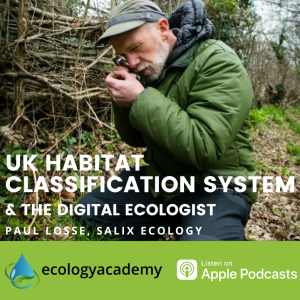
Monday Oct 03, 2022
Monday Oct 03, 2022
Welcome to the first episode in a brand new season of the Ecology Academy podcast!
In this month's episode we focus on delivering everything you need to know about the UK Habitat Classification System (UKHab) and why, as a digital ecologist, it matters.
Our Guest
Our guest on this episode is Paul Losse of Salix Ecology.
Paul worked as a Conservation Officer and Senior Specialist (land management and conservation) for English Nature and Natural England for 10 years. His roles have included providing advice to land owners on ecology, wildlife legislation, conservation land management, and carrying out habitat surveys. He has provided training and guidance to developers and local authorities on cases where nature conservation and protected species issues arise.
Paul also has nine years experience as a training consultant in the public sector.
Paul is the instructor on our popular training course, Introduction to QGIS for Ecologists.
UK Habitat Classification System
The UK Habitat Classification System was launched in 2018 and is a free-to-use, unified, and comprehensive approach to classifying habitats. It has been designed to provide a simple and robust approach to survey and monitoring for the 21st century.
The new classification, which covers terrestrial and freshwater habitats, is flexible enough for use in a wide range of survey types from walkover surveys of small urban sites to regional and national scale rural habitat mapping.
The classification, which includes a comprehensive Professional Edition and an abridged Basic Edition, will be a valuable tool for species and habitat research, ecological impact, ecosystem services, and biodiversity net gain assessments.
Ecology Academy News
Our popular 'Career Accelerator for Aspiring Ecological Consultants' course is back and we are ready for a brand new cohort of motivated students. This eight week online modular course kicks off on 17 October 2022 and will enable students/recent graduates/career changers to take significant steps towards achieving a permanent position as an ecological consultant in the UK.
To find out more about the course, or to enrol today, please click here.
Don't forget that you can follow us or get in touch via our socials or at hello@ecologyacademy.co.uk:
Website: https://training.ecologyacademy.co.uk/
LinkedIn: https://www.linkedin.com/company/ecology-academy/
Facebook: https://www.facebook.com/ecologyacademy
Instagram: @ecology_academy
Twitter: @ecology_academy
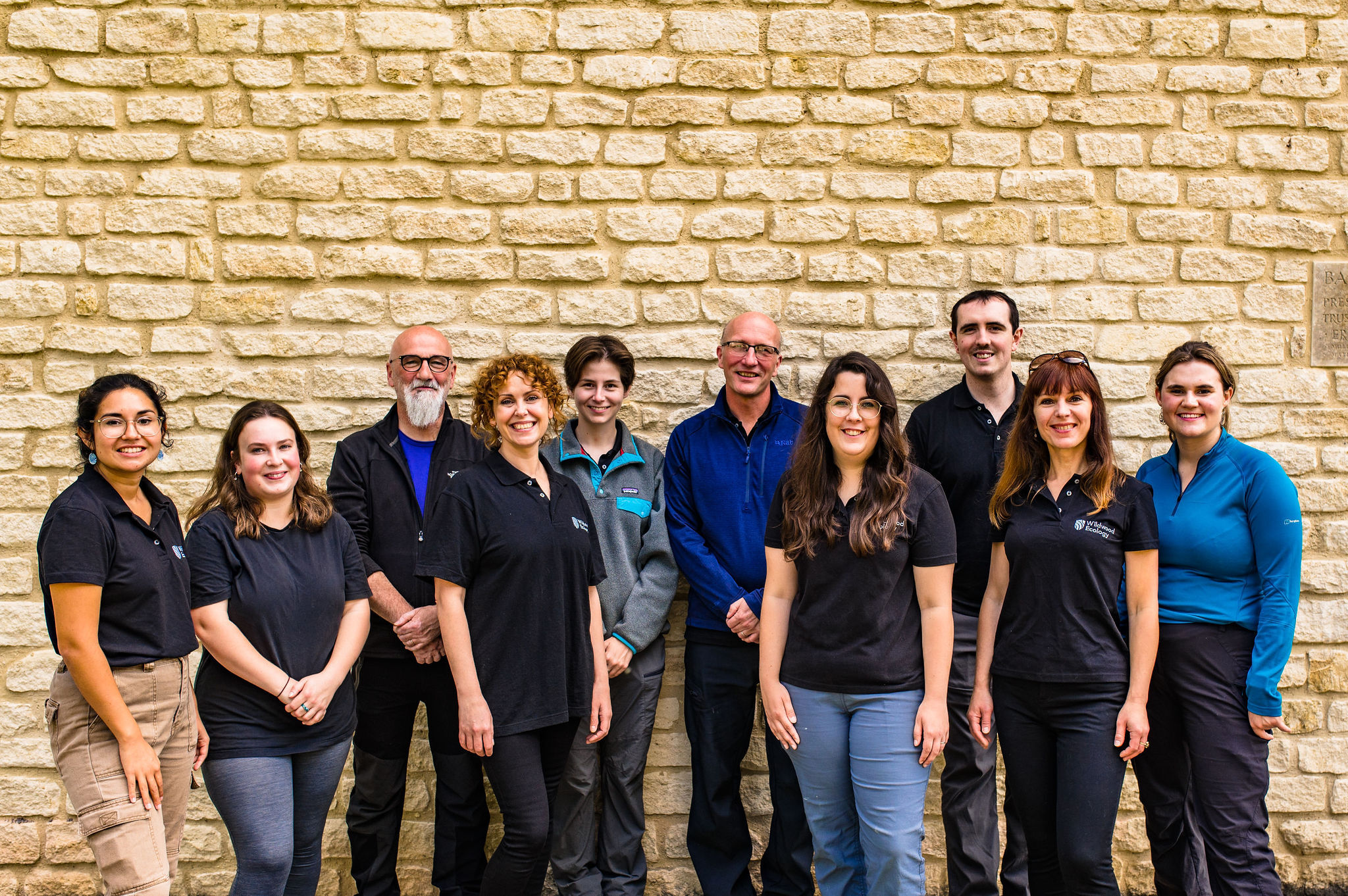
Ecology Academy Training
Online learning to help you get ahead in ecology.
It's a fact that many graduate ecologists struggle to secure that all-important first job. Competition, lack of real experience and absence of key skills can make it challenging to get the job you really want. Continuing to develop professionally may also take a back seat because 'real life' gets in the way. We teach the skills every professional ecologist needs in order to secure that job or bring greater value to the company you work for.
